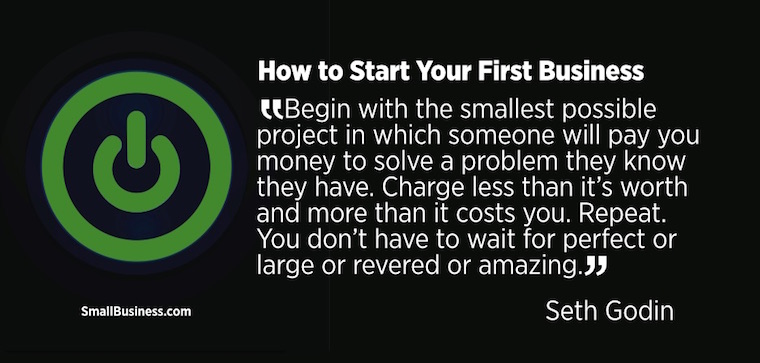SmallBusiness.com and the SmallBusiness.com/WIKI are filled with helpful advice about starting a small business. This article provides an overview of issues to consider if you are thinking about starting a business. More importantly, it provides links to articles that go in-depth on such issues.
Introduction: Start at the Beginning
So you want to start your own business? Congratulations. Right now, you’re probably focused on all of the great things you associate with business ownership:
- Financial independence
- Creative freedom
- Fully using your skills and knowledge
- A balanced life with the ability to have time with your family and frien
Right now, you may not be thinking about:
- Acquiring Customers
- Keeping Customers
- Risk (in various forms)
- Liability (various types)
- Paperwork (lots of it, even when it’s all done digitally)
- Competition (from constantly changing directions)
- Never having enough time
- Never quite knowing what you don’t know
Starting a business isn’t easy. It takes a lot of motivation, discipline, talent, research, planning and good old-fashioned hard work—before you can even hang your “open for business” sign. The topics covered in this overview just scratch the surface. The links you’ll find will take you a little deeper on a topic, but even then, any small business owner will tell you: You don’t always know what you don’t know.
The difference in starting a business and starting a startup
This is an overview of how to start a business, not how to start a startup. There’s a big difference. We once created a funny GIF “listicle” about the difference in starting a startup and starting a business, but the main difference is this: Startups are all about raising funds. Starting a business is all about having customers who pay you more money than it costs for you to provide the goods or services for that payment. Both kinds of companies are important to the economy. But our focus is on starting businesses, not starting startups. (If you need another example of the difference in starting a startup and starting a business, this profile of Jason Fried will help more than the GIFs.)
Before diving into all of the considerations you’ll find below…
You can look far and wide for information on how to start your first business, but we don’t think you’ll ever find any better advice than this wisdom from Seth Godin:
“Begin with the smallest possible project in which someone will pay you money to solve a problem they know they have. Charge less than it’s worth and more than it costs you. Repeat. You don’t have to wait for perfect or large or revered or amazing.”

Getting started: The self assessment
SmallBusiness.com/WIKI article: Questions to ask yourself and issues to consider before starting a business
In business, there are no guarantees of a perfect ending. There is no way to eliminate all the risks associated with starting a small business. But you can improve your chances of success with good planning, preparation and insight. And that starts by looking at yourself in the mirror and asking yourself a lot of questions. Here are just a few of the questions you’ll need to provide honest answers to.:
-
- Do you have what it takes to succeed?
- Do you possess the traits of a successful small business owner?
- Why do you want to start a business?
- What do you want to do?
- Is your idea feasible?
- The rest of the questions (…)
Spend a lot of time on this exercise. When you’re finished, take a look at the list and note any gaps. Lacking some of the traits of a successful small business owner doesn’t mean your business will fail, but it will give you a good idea of your strengths and weaknesses—and any partners, employees or advisers you may need to help you fill the gaps.

There are alternatives to starting a business from scratch
Depending on a wide range of factors, it may not be a good idea for you to start a business. Explore with trusted advisors other options for owning a business without starting one, including:
Buy a franchise
SmallBusiness.com/WIKI article: Buying a franchise
Becoming a franchisee of a successful franchising company can sometimes (but not always) increase the odds a business will succeed. But there are many factors which a potential business owner should consider. There are plenty of reasons, outlined in the SmallBusiness.com Guide to Buying a Franchise, for potential franchisees to beware.
Buy an existing business
SmallBusiness.com/WIKI article: Buying a business
Purchasing a business that is already operating can help a potential business owner succeed. But like acquiring the rights to a franchise, the buyer must beware.
Developing a business plan
SmallBusiness.com/WIKI article: Business plan
Have successful business started without a business plan? Probably. But is it risky? Definitely. No small business expert would recommend starting a business without a business plan. There’s too much at stake—-your money, other people’s money, the livelihood of your family and potential employees. That’s why a business plan is essential to starting a business and—as you’ll learn once you take the plunge into business ownership–running a business.
Parts of a business plan
Every successful business plan should include something about each of the following areas, since these are what make up the essentials of a good business plan:
-
- Executive Summary
- Market Analysis
- Company Description
- Organization & Management
- Marketing & Sales Management
- Service or Product Line
- Funding Request
- Financials
- Appendix
Once you have completed your business plan, review it with a friend or business associate or a small business counselor from the Service Corps of Retired Executives (SCORE) or a Small Business Development Center (SBDC). The business plan is a flexible document that could and should change as you develop your business idea and then as your new business grows.
Using your business plan
In the startup phase, you’ll use your business plan to guide you through the various phases of your new business, but you’ll also use it to attract investment capital, secure loans and attract strategic business partners. For these external eyes, a business plan shows whether or not a business has the potential to make a profit. It requires a realistic look at almost every phase of business and allows you to show that you have worked out all the problems and decided on potential alternatives before actually launching your business.

Choosing a business structure
SmallBusiness.com/WIKI article: Business structure
SmallBusiness.com: Side-by-Side Comparison Chart of Business Structures
Many factors must be considered when choosing the best form of business ownership or structure. The choice you make can have an impact on multiple aspects of your business, including taxes, liability and ownership succession.
There are four primary ways to legally organize a business: a sole proprietorship, a partnership, a limited liability company and a corporation. When organizing a new business, it is important to take time to review the pros and cons of each structure.
Sole proprietorship
SmallBusiness.com/WIKI article: Sole proprietorship
This is considered the easiest and least costly way of starting a business. A sole proprietorship can be formed by finding a location and opening the door for business. The owner operates the business, is personally liable for all business debts, can freely transfer all or part of the business, and can report profit or loss on personal income tax returns.
Partnership
SmallBusiness.com/WIKI article: Partnership
There are several types of partnerships. The two most common types are general partnerships and limited partnerships. A general partnership can be formed simply by an oral agreement between two or more persons, but a legal partnership agreement drawn up by an attorney is highly recommended. Profit, loss and managerial duties are shared among the partners, and each partner is personally liable for partnership debts. Partnerships do not pay taxes, but must file an informational return; individual partners report their share of profits and losses on their personal return.
Limited liability company
SmallBusiness.com/WIKI article: Limited liability company
A limited liability company (LLC) is a structure that gives its owners limited liability for the entity’s debts and obligations, similar to the status of shareholders in a corporation, and its income and losses are normally passed through to the owners as if it were a partnership. An LLC is a statutory creation. That is, unlike general partnerships which are developed under common law, an LLC is created by filing a document (usually called Articles of Organization) with an officer designated by state law.
Corporation
SmallBusiness.com/WIKI article: Corporation, S corporation, and C corporation
A business may incorporate without an attorney, but legal advice is highly recommended. A corporation is usually the most complex and most expensive way to organize a business. Control depends on stock ownership and is exercised through regular board of directors’ meetings and annual stockholders’ meetings. Records must be kept to document decisions made by the board of directors. Small, closely held corporations can operate more informally, but record-keeping cannot be eliminated entirely. Officers of a corporation can be liable to stockholders for improper actions. Liability is generally limited to stock ownership, except where fraud is involved. You may want to incorporate as a “C” corporation or “S” corporation.
Naming your business
While it seems simple, coming up with a name will probably be one of the most difficult steps of starting your business. There’s a lot riding on that name. For starters, you’ll have to like it and enjoy the way it sounds (you’ll be saying it a lot). At the same time, the name also needs to be unique so you can stand out among the competition, but not so unique that potential customers won’t know what you’re selling. If that’s not enough pressure, you’ll also want to check to see if the URL is available. Actually, checking URL availability might help you in the business name brainstorming process.
However you go about it, spend some time with a thesaurus and an empty sheet of paper and play around with name ideas. Once you have a few you’re happy with, test them out with family and friends. Before ordering letterhead, though, there are a few steps you’ll need to take to ensure that you legally can use the name you selected.
Legal requirements and implications
Before choosing a name, you’ll need to decide which business structure you will use. Naming your business (unless you’re a sole proprietorship or a partnership using your own name) is a formal process, which varies depending on the business structure you choose. For example, many states require a sole proprietor to use their own name for the business name unless they formally file anot1her name as a trade name, or fictitious name.
Similarly, you will need to determine whether your trade name will be the same as the full legal name of your business. Of equal importance is finding out whether your name or a similar name is being used by another business, and if so, what rights they may or may not have to use the name in the area where you do business. Keep in mind that some businesses only file trademarks within their locality, so it’s possible that the same name can be used elsewhere.
Research and registration
SmallBusiness.com article: Patent and trademark offices for all 50 states
Trade names can be registered through state Secretary of State offices, and for wider marketplace protection, through the U.S. Patent and Trademark Office (USPTO Trademark Search). Businesses should first use the USPTO’s online system to search all state and federal trademark registers to see if their proposed name is being used.
Website, domain names
SmallBusiness.com Guide: Guide to Small Business Website Basics
For many businesses that operate on the web, trade names are synonymous with domain names, such as Amazon.com and Yahoo.com. Domain names are not registered through state or local government; rather they can be obtained through numerous online businesses, most of which will allow you to conduct a name search prior to purchase to make sure your chosen name isn’t taken. But choosing and registering a domain name is just part of the online considerations that today are a part of starting any small business.
Funding your business
An integral component of starting a successful business is raising sufficient funds, also called capital. whether from your personal savings, a bank loan, an investor, a credit card or a combination of all four. There are many challenges associated with funding a new business, but like with any important decision, careful planning can help you anticipate any obstacles.
Estimating startup costs
To determine your startup costs, you must identify all the expenses that your business will incur during its startup phase. Some of these expenses will be one-time costs, such as the fee for incorporating your business or price of a sign for your building. Some will be ongoing, such as the cost of utilities, inventory, insurance, etc.
When identifying these costs, decide whether they are essential or optional. A realistic startup budget should include only those things that are necessary to start that business. These essential expenses can then be divided into two separate categories: fixed and variable. Fixed expenses include rent, utilities, administrative costs and insurance costs. These expenses must be paid regardless of sales, and are often referred to as overhead costs. Variable expenses include inventory, shipping and packaging costs, sales commissions, and other costs associated with the direct sale of a product or service. Variable costs fluctuate directly with sales volume.
The most effective way to calculate your startup costs is to use a worksheet that lists all the various categories of costs (both one-time and ongoing) that you will need to estimate prior to starting your business. An alternative to a worksheet is an online startup calculator.
Performing a breakeven analysis
The breakeven point occurs when revenue equals all business costs. Estimating this will help when you determine how much startup funding you’ll need—and for how long. Performing a breakeven analysis will also help you determine if you have a viable business idea.
Weighing your financing options
Raising capital is the most basic of all business activities. You need to spend money to make money, right? But securing the capital necessary to start a business can be a daunting challenge. The good news is, there is funding available for new small business owners from traditional and non-traditional sources.
Self-financing
The primary source of capital for most new businesses comes from savings and other personal resources. While credit cards are often used to finance business needs, there are usually better, less risky options available, even for very small loans
Traditional business financing
Traditional business financing options include loans or lines of credit from a traditional lending institution, such as a bank or credit union. In order to secure traditional business financing, you generally need to prove or provide the following:
Ability and willing to repay the loan: Lenders will check your credit report to see that past payments were made as agreed and on time. Traditional lenders also like to see at least three potential sources of collateral (including projected cash flow).
A sound business idea: Just because you pass the first test doesn’t mean a traditional lender will approve your application. You also have to prove that you have created a sound business idea and that you and your startup team hold the expertise necessary to carry out the idea as outlined in your business plan. Before approaching a lender, ask yourself: Do you have sufficient experience and training to operate a successful business? Any traditional lender will want a solid answer to that question.
Alternative sources of financing
SmallBusiness.com Guide: SmallBusiness.com Guide to Alternative Financing
If you cannot secure financing from traditional lenders, there are other sources of financing:
Social lending (peer-to-peer lending)
Small business grants
Community programs
Angel investing
Equity capital
Protecting your ideas
SmallBusiness.com/WIKI articles: Copyrights and trademarks and Patent
Intellectual property is important to your small business. It’s your ideas–and their implementation—that have gotten you to the point where you’re starting a business. Whether it’s the business name, the logo for your business cards, a slogan to make you stand out from the competition, or a product or service, you’ll want to protect those ideas. In some instances, businesses may want to apply for trademarks, patents or copyrights to protect a trade secret or to register a name or distinctive logo.
Here are the most common types of intellectual property marks you should be familiar with:
Trademark
A trademark (TM) refers to names or symbols used in any commerce that is subject to regulation by state government or the U.S. Congress. Trademarks and service marks may be registered in a state for a term of ten years. Placing a trademark after your product or service name indicates the company’s intent to protect the mark used by the company related to its products or services.
Similar to the TM mark, the service mark (SM) differs from a trademark in that the mark is used in regards to a service rather than specific products or the packaging or delivery of the service.
Patent
A patent is a set of exclusive rights issued by a government agency declaring someone the inventor of a new product and having the privilege of stopping others from making, using or selling the claimed invention.
To obtain a patent, an application must be made through the U.S. Patent and Trademark Office. Once application is made but before it’s approved, businesses can use “patent pending” language.
Copyright
A copyright is protection for the works of authors, composers, programmers, artists and others who create intellectual property. A copyright prevents illegal copying of written matter, works of art or computer programs.
To obtain a copyright, there is no form to complete or fee to pay. A work must simply have three elements: The © symbol (the word “Copyright” or the abbreviation “Copr.” will substitute), the year of first publication and the name of the author or owner. Copyrights last for the author’s life, plus 70 years.
Complying with government regulations
SmallBusiness.com/WIKI articles: Directories:U.S. Government small business internet resources
It may be inconceivable to you that your home-based consulting service or handknit sweater business would have to comply with any of the numerous local, state and federal regulations, but in all likelihood it will. Avoid the temptation to ignore regulatory details. Doing so may avert some red tape in the short term, but could be an obstacle as your business grows. Taking the time to research the applicable regulations is as important as knowing your market.
Below is a list of the most common requirements that affect small businesses, but it is by no means exhaustive. Bear in mind that regulations vary by industry. If you’re in the food service business, for example, you will have to deal with the health department. If you use chemical solvents, you will have environmental compliance to meet. Carefully investigate the regulations that affect your industry. Being out of compliance could leave you unprotected legally, lead to expensive penalties, and jeopardize your business.
Business Licenses
There are many types of licenses. You need one to operate legally almost everywhere. If the business is located within an incorporated city limits, a license must be obtained from the city; if outside the city limits, then from the county. For more information contact the county or city office in your area or try these state web sites that offer business license information You should also go to the website of your home state and hometown and search for “business license” or “county information” to review local regulations. Certain types of trades and services, ranging from being a barber to brain surgeon, also require state and local licensing. Refer to state and local agencies to review such requirements.
Affordable Care Act
On SmallBusiness.com: Affordable Care Act Tax Information
While businesses with less than 50 employees are not required to provide employees healthcare insurance, many do. If you are one of those companies, then you must adhere to the guidelines of the Affordable Care Act (ACA). If you don’t provide healthcare insurance through a group plan, you are required to purchase healthcare coverage for yourself or pay a penalty (tax) as part of your annual federal taxes.
Certificate of Occupancy
SmallBusiness.com/WIKI articles: Certificate of occupancy
If you are planning on occupying a new or used building for a new business, you may have to apply for a Certificate of Occupancy from a city or county zoning department. For more information contact the county or city office in your area. You should also go to the website of your home state and hometown and search for “certificate of occupancy” or “county information”.
Fictitious Business Name
Businesses that use a name other than the owner’s must register the fictitious name with the county as required by the Trade Name Registration Act. This does not apply to corporations doing business under their corporate name or to those practicing any profession under a partnership name. For more information contact your state or local government. You should also go to the website of your home state and hometown and search for “trade name registration” or “county information”.
Immigration Act
The Federal Immigration Reform and Control Act of 1986 requires all employers to verify the employment eligibility of new employees. The law obligates an employer to process Employment Eligibility Verification Form I-9. The Immigration and Naturalization Service Office of Business Liaison offers a selection of information bulletins and live assistance for this process through the Employer Hotline. In addition, INS forms and the Employer Handbook can be obtained by calling the Forms Hotline. For Forms: (800) 870-3676, Employer Hotline: (800) 357-2099
Health and Safety
The Federal Occupational Safety and Health Administration (OSHA) outlines specific health and safety standards employers must provide for the protection of employees. Many states have similar standards.
Workers’ Compensation
If a business employs three or more people, workers’ compensation insurance must be carried to provide protection to those injured in on-the-job accidents. The State Board of Workers’ Compensation aids people who need claim assistance. For more information contact your state government small business agency.
Minimum Wage — Virtually all business entities are subject to the federal minimum wage, overtime and child labor laws. Information on these laws and other federal laws, may be obtained from: U.S. Department of Labor, Wage and Hour Division
Understanding taxes
SmallBusiness.com Guide: Small Business Guide to Taxes
Business owners are required by law to withhold the following from the wages paid to employees: federal income taxes, state income taxes and FICA Social Security insurance.
Income taxes will also be levied by the federal and state governments on earnings of any business. Therefore, each business must file an income tax return with both agencies. Businesses may be required to file estimated tax returns and pay estimated taxes on a quarterly basis.
You can go to IRS’s website area for business taxes or call your local IRS office to receive a number of publications that are available upon request to small businesses. One of the most helpful is Your Business Tax Kit, which includes data and forms for a Federal Employer Identification Number and a tax guide for small businesses that can be ordered by calling Forms and Publications at (800) 829-3676 or through a visit to your local IRS office.
You may want to contact your local Social Security Administration office for (FICA) insurance information or visit the SSA Employers’ Information web site.
Employer identification number
SmallBusiness.com/WIKI articles: Employer identification number
To pay federal taxes, withhold Social Security contributions for employees and for other reasons, a business needs an Employer Identification number.
Federal self-employment tax
Everyone must pay Social Security tax. If you are self-employed, your Social Security contribution is made through the self-employment tax. You will need to calculate how best to report earnings and pay your business taxes. Contact the IRS at (800) 829-1040, visit your local IRS office, or go to the Official IRS Web site for more information. The IRS may seem like a complicated maze, but there are publications, counselors and workshops available to help you sort it out.
Sales tax and sales tax number
In your state there is a percent sales and use tax which applies to the retail purchase, retail site, rental, storage, use or consumption of tangible personal property and certain services. In other words, sales tax must be collected on just about every tangible item sold.
A sales tax number is required for each business before opening. The number, plus instructions for collection, reporting and remitting the money to the state on a monthly basis, can be obtained from your state government.
Unemployment insurance tax
Businesses are required by the state to pay unemployment insurance tax if the company has one or more employees for 20 weeks in a calendar year, or it has paid gross wages of $1,500 or more in a calendar year. Go to your state home page to check the figures for your state. Unemployment insurance must be reported and returns made to the state.
Getting business insurance
Like home insurance, business insurance protects the contents of your business against fire, theft and other losses. Contact your insurance agent or broker. It is prudent for any business to purchase a number of basic types of insurance. Some types of coverage are required by law, other simply make good business sense. The types of insurance listed below are among the most commonly used and are merely a starting point for evaluating the needs of your business.
Liability insurance
Property insurance
Business Interruption
Key Man
Automobile
Office and Director
Choosing a location
Choosing the right location for your business can be a major factor in its success or failure. A good location may allow a struggling business to survive, but a weak location could mean trouble for even a very well-run business. Or maybe you don’t need a location just yet—maybe a home office would suffice for now.
Whatever location you choose, make sure you know all of the legal restrictions on your place of business, including:
-
- Home-based business regulations
- Commercial leasing
- Zoning requirements
See also on the SmallBusiness.com/WIKI
- Category:Starting a business
- SCORE – Volunteer organization of retired executives who counsel and assist small business owners.
- Small Business Development Center – A program of the SBA that assists small business owners and startups.
- Directories:U.S._Government_small_business_internet_resources – Directory of online government resources for small business owners
- IRS business tax resources
Other resources on the web
- SBA.gov Small Business Planner – This entry includes information from this helpful SBA guide.
- Guide to Starting, Operating and Closing a Business – IRS.gov – Information on business formation from the U.S. Internal Revenue Service.
- Service Corps of Retired Executives (SCORE) – SBA-backed volunteer group of retired business executives provides free assistance to help start and run small businesses.
- Business Start-up Organiser (UK govt. site) – UK small business start up information
- Your Business, Business Owner’s Toolkit, toolkit.com
- Estimating Startup Costs, SBA.gov
- Will My Business Make Money? Nolo.com
Photos: ThinkStock




